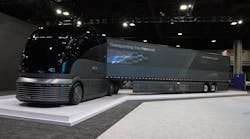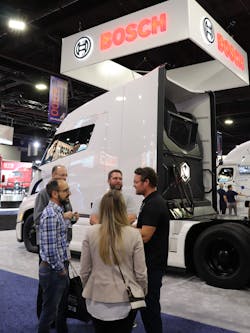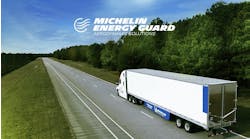I’ve always been fascinated by new technologies like the ones from sci-fi movies I watched growing up. How great it will be, I thought, when hoverboards, robot assistants, and giant exoskeletons were available to buy. Decades later, none of this futuristic tech panned out like I’d hoped, and when I started writing about advanced industrial technology, the reasons why became clear. Getting a product—even a really cool one—to market is hard and takes years of R&D, expensive tooling, and a large enough customer base to sell and generate profits. I had learned a valuable lesson.
Then, in 2019, I came across some heavy-duty hydrogen fuel-cell electric vehicle (FCEV) protypes at the North American Commercial Vehicle show and forgot all that. The trucks looked great and the science was intriguing and familiar to me. The fuel-cell reaction works similar to the electrolysis used in a submarine’s oxygen generator. In that system, an electrical charge split seawater molecules, jettisoning the hydrogen and keeping the oxygen.
In a fuel cell, hydrogen splits into positive and negative ions at the anode. The negative hydrogen ion creates a charge at the polymer electrolyte membrane, and then combines with the positive ion and oxygen to become water. The generated electricity charges the battery, and from there the truck operates like any electric vehicle.
At the show, Hyundai had a sleek concept heavy-duty truck with a streamliner train-inspired body, called the HDC-6 Neptune Concept. The spacious cab interior even had space for a shower. Kenworth displayed its own FCEV, as did Cummins.
I also noticed a charismatic entrepreneur named Trevor Milton hanging around the Bosch booth, swarmed by curious showgoers who were asking about his company, Nikola Motor Co., and the Nikola Two FCEV prototype. A month earlier, CNH Industrial invested $250 million in Nikola and the buzz was still strong. I was excited to tentatively set up an interview with him to learn more about the company, because, after all, it was fascinating and futuristic. And I sure couldn’t wait to find out how Milton shot to tech stardom.
Trust me, I also find that wide-eyed optimist version of me cringey, too. I would write a lot more about fuel cells—instead of learning about aftertreatment systems, tag axles, and other real components. And I had a few interviews with Milton, the ultimate hydrogen hype man. The earnest Utah native had dropped out of college, became a billionaire when Nikola went public, and found himself squared off against Tesla and Elon Musk, who dismissed fuel cells as “fool sells.” He was just as fascinating as FCEVs.
Brave but foolish
Through it all, my editor, who had been covering the sector for close to two decades longer than me, was skeptical of Milton and FCEV adoption any time soon. He was also skeptical of the long-delayed Tesla Semi, too.
And he was right, of course. These things take time and there are no shortcuts in trucking for a reason. Safety issues, infrastructure, supply chain, and maintenance support all need time to develop. A lot of time.
In September 2020, a shortseller called Hindenburg Research alleged Milton did take some short cuts. This marked him as a fraud, though he will have his day in federal court this summer (U.S. v. Trevor Milton). The indictment accuses him of “making false and misleading statements directly to the investing public” through the press and social media. Was I complicit? Was I fooled? If so, I had plenty of company, including major investors.
Looking back, though, Milton told me exactly who he was when he claimed a Nikola FCEV lease would cost $1 per mile, which would include “the truck, the service, the warranty, the maintenance, all of it.” Or when he said as a kid he marked up candy bars on the school playground. He was always more P.T. Barnum than Nikola Tesla, especially when he claimed that hydrogen would be more affordable than diesel anytime soon. I don’t doubt he believed he could will it to fruition. But it takes more than one person’s willpower.
Fuel-cell technology was discovered by a Welsh physicist, William Robert Grove, in the late 1830s. Martin Van Buren was our president then. And since then, no one could muscle fuel cells over the finish line, not even former Terminator/governor of California Arnold Schwarzenegger, who introduced the Hydrogen Highway plan in 2004 to build fueling stations. According to the latest U.S. Department of Energy data, California has only seven heavy-duty fueling stations, with two more planned, and 54 light-duty stations open and 34 planned.
The funny thing about tech is you wait long enough and it just might happen. Lexus did make a hoverboard (that worked on a specially-made magnetic skate park), while Boston Dynamics robot dogs and powered exo suits are already finding niche uses.
Companies such as Cummins and Paccar had inched along for years, and their patience paid off as well. Those two, as well as several other companies are piloting FCEVs in California right now, or will be soon. Our special report on hydrogen trucks details many of them. Hyundai’s is more a regular truck than a space train (sans shower).
See also: The dawn of hydrogen trucks
Phoenix-based Nikola also made the list, seeking to rise from the ashes by scaling up infrastructure and building up their new plant, which is already making battery-electric trucks. And the full-service lease program that includes the truck, fuel, and maintenance still seems to be a real possibility. We may find that out in 2024, when the Nikola Two Sleeper FCEV is expected to become available.
Even with many projects up and running, the DOE projects long-haul heavy-duty FCEVs (with a range of over 500 miles) won’t be cost-competitive with diesel until 2035.
Still, it would be foolhardy to simply ignore the technology. What started as hype and slow growth could pick up steam fast.
“The urgency is not just to continue to move the cost down to lower that barrier, but also there is urgency to lay the foundation of knowledge within the operations people, the maintenance people,” said Wido Westbroek, senior director of fuel-cell strategic projects for Cummins. “All those other skill sets that have to participate in ensuring that it is a success when it’s on the road. That is also now part of our work.”





